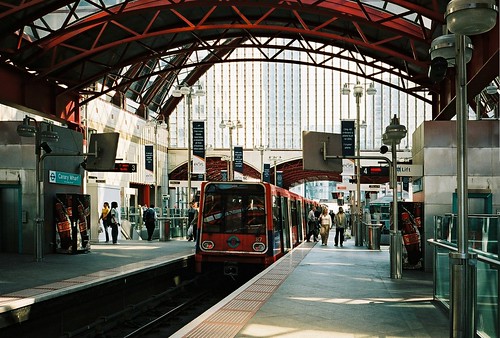The Docklands Light Railway in London is a fine system but falls awkwardly between two stools, probably because of the ad-hoc way it grew up.
Constructed with the aim of opening up the former docklands area of east London and opened in 1986, it ran originally from Tower Gateway to Stratford and Island Gardens, mostly on disused railway viaducts. At the planning stage, there was talk about short sections of on-street running, but in the end this never happened. Early decisions made were to use light rail tramway type vehicles, driverless trains under remote control, and an unusual system of third rail electrification, the latter, seemingly for aesthetic reasons at the request of the planners in the London Docklands Development Commission.
Subsequent extensions were made to Bank in 1991 and Beckton in 1994. Further expansion took place with the opening of branches to Lewisham in 1999, London City Airport in 2005 and Woolwich Arsenal in 2009.
It was evident from the outset that the line would be inadequate once the Canary Wharf development was complete and an eastward extension of the Jubilee Line tube was built from Bond Street to Waterloo, Southwark, Bermondsey, Canary Wharf, North Greenwich and Stratford, opening in 1999. The section of the Jubilee Line from Bond Street to Charing Cross, opened in 1979, was then abandoned.
Wisdom after the event
With the benefit of wisdom after the event, one must wonder if this was the most cost-effective way of improving transport for a redeveloped docklands. There have been five different types of rolling stock, of which the original cars were in service for just five years before being disposed of. There was a considerable amount of tunnelling, which would have been less costly if the lines had been constructed to tube standards. And building to tube standards would have provided the capacity needed to shift people from the redeveloped Canary Wharf, thereby probably avoiding the need to construct the Jubilee Line Extension.
Another alternative would have been to adopt conventional heavy rail standards. In that case the route could have integrated the services on the two sides of the Thames, avoiding the need for changes at Stratford and Lewisham.
A third option would have been to adopt conventional tramway standards, with overhead electrification and human drivers. With a mixture of dedicated routes and on-street running, this would have avoided some very costly civil engineering works, especially for the Lewisham extension with its extensive viaducts and diversion of the the river Ravensbourne.
The tramway solution would also have had the advantage that passengers were not deposited a long walk away from a popular shopping centre, on the wrong site of a busy main road. Instead, the line could have run on-street into Lewisham High Street, and eventually to Catford and perhaps Bromley, all at a fraction of the cost. Other on-street extensions would also have been possible north of the river.
The moral: big projects should be designed with an end in view and not made up as they go along.
Constructed with the aim of opening up the former docklands area of east London and opened in 1986, it ran originally from Tower Gateway to Stratford and Island Gardens, mostly on disused railway viaducts. At the planning stage, there was talk about short sections of on-street running, but in the end this never happened. Early decisions made were to use light rail tramway type vehicles, driverless trains under remote control, and an unusual system of third rail electrification, the latter, seemingly for aesthetic reasons at the request of the planners in the London Docklands Development Commission.
Subsequent extensions were made to Bank in 1991 and Beckton in 1994. Further expansion took place with the opening of branches to Lewisham in 1999, London City Airport in 2005 and Woolwich Arsenal in 2009.
It was evident from the outset that the line would be inadequate once the Canary Wharf development was complete and an eastward extension of the Jubilee Line tube was built from Bond Street to Waterloo, Southwark, Bermondsey, Canary Wharf, North Greenwich and Stratford, opening in 1999. The section of the Jubilee Line from Bond Street to Charing Cross, opened in 1979, was then abandoned.
Wisdom after the event
With the benefit of wisdom after the event, one must wonder if this was the most cost-effective way of improving transport for a redeveloped docklands. There have been five different types of rolling stock, of which the original cars were in service for just five years before being disposed of. There was a considerable amount of tunnelling, which would have been less costly if the lines had been constructed to tube standards. And building to tube standards would have provided the capacity needed to shift people from the redeveloped Canary Wharf, thereby probably avoiding the need to construct the Jubilee Line Extension.
Another alternative would have been to adopt conventional heavy rail standards. In that case the route could have integrated the services on the two sides of the Thames, avoiding the need for changes at Stratford and Lewisham.
A third option would have been to adopt conventional tramway standards, with overhead electrification and human drivers. With a mixture of dedicated routes and on-street running, this would have avoided some very costly civil engineering works, especially for the Lewisham extension with its extensive viaducts and diversion of the the river Ravensbourne.
The tramway solution would also have had the advantage that passengers were not deposited a long walk away from a popular shopping centre, on the wrong site of a busy main road. Instead, the line could have run on-street into Lewisham High Street, and eventually to Catford and perhaps Bromley, all at a fraction of the cost. Other on-street extensions would also have been possible north of the river.
The moral: big projects should be designed with an end in view and not made up as they go along.

Kommentarer